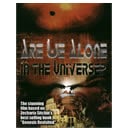
Life Beyond: The Dawn
When we look around the planet, one thing is consistent. Life will thrive even in some of the most extreme places on Earth. These include the driest deserts, the top of frozen mountains, deep trenches within the ocean floor and more. There are always signs of life in these places, such as plants, animals, fungi and even tiny alien-like microbes.
It has been a total of 4 billion years since life began on Earth. The planet looked very different back then, not the nurturing habitat but a dark alien-like planet. A combination of volcanic explosions and other events sparked creation. Once the planet cooled down enough, the planet's earliest life forms were formed, deep in the bottom of the pre-historic oceans.
Atoms are freer to move and flow within a liquid vs a solid or gas and combine with other molecules to form more complex organisms. Add some heat from the sun, oxygen, carbon and sulfur gases into the mix, and voila, the first cells emerged. From then on, life developed rapidly, with one complex organism evolving into more complex beings culminating with us humans.
Because it happened quickly here on Earth, it stands to reason that it can happen on other planets, too. After four billion years, it's now time to find an answer to one of the biggest questions asked by humanity: Are we alone in the universe?
Now more than ever, the truth may finally be within our reach. Advances in technology and the looming reality of commercial space flight have some NASA scientists convinced that within a few decades, we will have answers.
How life on Earth came to be can give us clues on where to start looking for our "cosmic kin." Since life began in the water, it makes sense to look for planets with oceans or ocean worlds like Earth. Some candidate planets include Kepler 62F, Trappist 1D, Teegarden B, and K2-18B, which confirmed atmospheric water vapor.
But of course, many of these planets in our galaxy that are awash in water won't be habitable to human life as we know it. It will indeed be a hit and miss search for the right one. And if by chance none of the planets will do, any one of the estimated 100 trillion planetary moons in our galaxy alone might work out as our new home. Some may have surface water or oceans and share the same size and atmosphere as Earth.
The next few years will be exciting regarding what we might find out there. Right now, accessible commercial space travel is closer to becoming a reality with the Space X and Blue Origin programs. A mission to Mars is currently planned by both NASA (target date is 2030) and Space X (2026).
With so many places to find life, just in our galaxy alone, it might only be a matter of time before we make a discovery.
Directed by: John D. Boswell




There are far too many issues facing humankind in the here and now that in my opinion make this subject not more than another fantasy to entertain us. Billion are wasted on exploring other worlds, money and effort better utilize solving the many crisis and issues in front of us now as in respecting all life on Earth right down to the smallest form. I will wonder why we are preoccupied with life elsewhere in the multiverses. Is it so we can continue to trash earth with impunity and say to hell with this planets lifeforms lets go and destroy somewhere else's life forms?
Furthermore INTELLIGENT life may be something all around us now just not recognizable and nothing like the form we occupy as earthlings humanoids!
Awesome. Heavy Element, Liquid and boOzyhyet. There is a habitable planet out there before us near big bang.
LMAO @ Kubhi! Lies? Science is built on observations, experiments and repeated results. Not on manufactured conclusions.
Rated a 10. Actually I liked that it wasn't 60 min plus!
What's a manufactured conclusion? - religion and probably Kubhi's beliefs.
total limited bullsh*t
Seriously, how can you tell it is 4 billlion years while we hardly never know of any human who happened to live even to a thousand years...! What a misinformation! Keeping on inheriting lies!
Pure conjecture is the theme of everything presented in this doc. There is a tremendous presumption about the requirements for "life" to exist, e.g. the presence of water.
Says who, material scientific observation which is flawed at best? The scientific movement has made the same mistake as Buddhist philosophy has, i.e. because the observable is limited in its scope, the absolute must be the exact opposite which, of course, then precludes the possibility of unlimited omnipotence. The Vedanta Sutra of India makes this very clear, there is no limitation to the Absolute. As soon as one imposes preconceived notions as to the existence of life universal, one is then doomed to not understanding the Absolute Truth. Good luck in your search for other life in the Universe, which already exists before you, but ignorance blinds you to it.